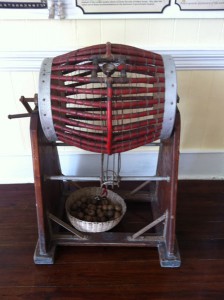It seems everyone in Belize is buying Boledo these days. Though, no one seriously expects to retire on a Boledo winning as they are small in comparison to the lottery that can be won in other countries, it is one of Belize’s favorite pastimes. Boledo, originally “boleto”, Spanish for ticket, is over half-a-century old and remains very popular among Belizean’s. The Boledo is a gambling game that requires two numbers and there are as many winning strategies as there are players, but most people still rely on dreams, accidents, and even the writings of fortune-tellers like King Tut to bring them some luck.
These days, much discussion goes into the interpretation of an isolated event, dream or even when last a specific number was drawn. For the elder Boledo buyers, noted references were the King Tut and Aunt Sally dream books. The use of dreams is based on the Bible story of Joseph interpreting Pharaoh’s dream of seven years of famine and drought – an event heavily alluded to in the preface of King Tut’s dream book.
Though their lucky number may not play for quite some time, many buyers believe that they’ve got the right formula for the win. It is the hope of winning that keeps them buying and until that hope dies or the Boledo disappears, numbers, dreams and coincidences will remain and daily part of the Belizean life and language.
THE EVOLUTION OF THE BOLEDO
Before there was the Boledo, there was the Drop Pan and Panama.
Drop Pan – According to the Brukdown Magazine, the predecessor of the Panama was Drop Pan, played in the 1930’s. Instead of numbers, the names of animals and birds were used. Names and sketches corresponding to the names of the creatures were placed in a pan for the weekly draw. The pan was dropped from a pole and then a woman was selected at random to draw from those names and sketches which were ejected from the pan as it hit the ground. But it wasn’t until the Panama came to town, that gambling took a new turn.
Panama aka “Taking a Chance” – The Panama game was brought into the country by workers returning from Panama in 1944. Numbers ranged from 00 to 99 with the winning numbers chosen on Sundays in Panama. Keen to continue the Panama in Belize, enterprising individuals began to sell the numbers despite the $250 fine for illegal gambling. The buyers of “Panama” were “taking a chance” as there was no guarantee of payment upon winning. The system was based solely on trust and on the integrity of the individual seller. Due to the popularity of the weekly Panama and the inability of the authorities to enact the law against the illegal games, it was realized that legalizing lottery could be a better outcome. In 1945, lottery sellers were given legal sanction as they were placed under the control of an official appointed Lotteries Control Committee. The profits go to a charity fund that support educational, cultural and sports programs.
Today’s Boledo game that plays weekly from Monday to Friday at the old Treasury Building in Belize City, was brought to Belize from the United States by migrant workers sometime between 1946 and 1947. With the evolution of the game came various Boledo lingoes such as PUP, Free Ticket, Rake, Five Piece, Whoppy and Back and Front all described below.
PUP (illegal Boledo) – numbers sold on the back of tickets issued by the government or simply on scraps of paper.
Free Ticket – when a vendor gives a number on the sale of a PUP.
Rake – the winning number; the number is usually chosen based on unusual events during the course of the day. For example: a man falls and hits his head, the rake could be the age of the man, a number for the head based on the Doukie Skeleton.
Five Piece – the smallest Boledo ticket that can be bought. The payout is BZ $17.50.
Whoppy – when a winning number plays consecutively or more often.
Back and Front – when a ticket is bought with the number in either order; e.g. 21/12

Despite initial glitches and claims of unfair drawing, the most famous being the “frozen ball” incident, the Boledo entered Belizean psyche and the rest, as they say, is history.
Today, the actual selling of the tickets is done by individuals who receive a commission on their total sales plus an established bonus if they do not sell the winning number. The draw has since been modernized and ticketing automated.
While the actual game is owned by the Government of Belize, Brads Gaming Company Limited privately operates the National Boledo Franchise. Day-to-day operations are overseen by the Government’s Lotteries Commission and the Government-appointed Lotteries Supervisor overseas each drawing. The results of each draw can be found on MyBelize.Net.
More information regarding the Boledo can be found in the Lotteries Act.
Thanks to NICH and the House of Culture for their informative display on the Boledo.

